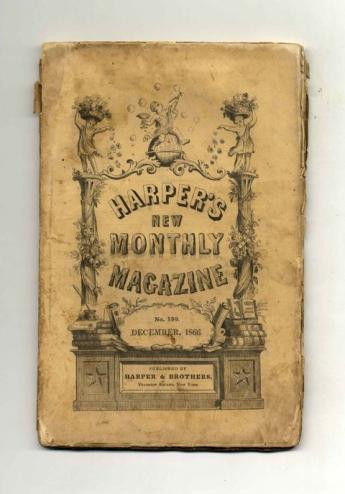Antiquarian Booksellers' Association of America Books Tell You Why, Inc.
Book Conservation - Ghosting and Sunning and Foxing, Oh My!

By Kristin Masters
If you're new to the world of book collecting, you've undoubtedly encountered plenty of jargon already. Rare and antiquarian book dealers often painstakingly describe a book's condition because it's such an important aspect of the book's value. Reputable dealers are as accurate as possible in their descriptions, and it's not unusual to run into the terms "ghosting," "sunning," and "foxing," all of which refer to different causes of discoloration to paper.
Ghosting
Sometimes also called shadowing, ghosting occurs when a paper fades unevenly and is left with a visible line between lighter and darker areas of the page. A common culprit of ghosting is prolonged exposure to paper or adhesive, such as when a bookmark is left in a book for a long time. Because most papers and adhesives are acidic, they cause a chemical reaction on the pages they touch. Over time, the part of the book's page that touches that bookmark (or tape, etc) will become lighter, and when the bookmark is removed, the impression of its outline will remain on the page.
When you purchase a book, check it thoroughly - and gently - to find any rogue papers or adhesives. If you find any papers hidden between the leaves of your book, carefully note their location. Store the items separately in archival envelopes or pouches. (Read more about ghosting)
Sunning
Sunning refers to fading that occurs when a book is exposed to light. The name is a bit of a misnomer because uneven exposure to a wide variety of light sources can cause this type of fading. Light can trigger chemical breakdown in not only paper, but also fabric and leather. The spine of a book or its dust jacket is a likely place to suffer sunning because the spine is exposed all the time, while the boards are protected from light exposure by adjacent books on the shelf.
It's impossible to stop the breakdown once it starts, though removing your books from exposure to UV light can slow it considerably. Storing your books in room with no direct sunlight, using UV filters, and placing mylar covers on your books are all excellent measures to protect your library from sunning. (Read more about sunning)
Foxing
Foxing refers to the brown splotches, specks, and patches you often see in antiquarian books, especially those from the eighteenth and nineteenth centuries. They're caused by growth of fungi or mildew, usually because the book has been exposed to excessive moisture or humidity. To prevent foxing, keep your home library as dry as possible.
Unlike sunning and ghosting, foxing may be reversed with the assistance of a skilled conservator. The method depends on the severity of the foxing, along with the type of paper and other factors. One "home remedy" for foxing is bleaching the paper. This should be avoided at all costs, and you should look for signs of bleaching before making any major book purchase; bleaching drastically accelerates the degradation of paper. (Read more about foxing)
In most cases, it's best to leave treatment of ghosting, sunning and foxing to a skilled conservator. As a collector, however, you can create the ideal environment for your rare books, one that will keep them cool, clean, dry, and out of direct light.
What's your greatest challenge in protecting and maintaining your rare book collection?
***
Posted on Books Tell You Why. Presented here by permission of the author. Picture: Books Tell You Why.
